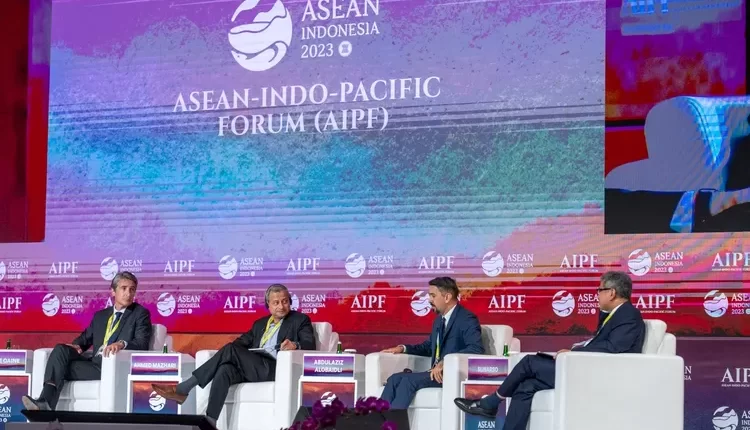Through AIPF Indonesia Encourages Collaboration Amid Geopolitical Competition
Jakarta – Indonesia is holding the ASEAN Indo Pacific Forum (AIPF) as the flagship event of the ASEAN Summit 2023. The agenda entitled “Implementation of the ASEAN Outlook on the Indo-Pacific” is one of the highlights of the 2023 ASEAN Indonesia Chair to increase ASEAN cooperation with partner countries in the Indo-Pacific region.
Indonesian President Joko Widodo (Jokowi) at the opening of the ASEAN-Indo-Pacific Forum (AIPF), invited intensive collaboration so that no member or country feels excluded.
“Our region is not immune from various global challenges and sharpening geopolitical rivalries, especially the potential for conflict in the Indo-Pacific. “For this reason, the ASEAN-Indo-Pacific Forum is here to transform rivalry in the Indo-Pacific into useful cooperation, and build a habit of cooperation with a win-win formula, without anyone feeling excluded,” said the President in his speech.
President Jokowi also emphasized that AIPF has three main agendas. First, green infrastructure and a resilient supply chain, including through industrial downstreaming and building an electric vehicle (EV) ecosystem.
“The ASEAN economy will grow stronger through industrial downstreaming and the development of an EV ecosystem is a concrete example of building a regional supply chain,” he concluded.
Second, sustainable and innovative financing.
“ASEAN needs 29.4 trillion US Dollars for the energy transition, and requires innovative financing schemes through profitable and sustainable partnerships,” said the President.
Third, digital transformation and the creative economy.
“The digital economy in ASEAN in 2030 is estimated to grow to 1 trillion US Dollars, and the adoption of digital innovation needs to be strengthened to support the creative economy and MSMEs,” he added.
On this occasion, Indonesian President Joko Widodo also announced a list of concrete projects between ASEAN Member States and Dialogue Partners, worth US$ 56 billion from 166 projects which are important milestones for the implementation of the ASEAN Outlook on the Indo-Pacific.
The forum then continued with a panel attended by the President of the World Bank, Managing Director of the IMF, Chairman of the World Economic Forum, and President of ERIA, and moderated by Chatib Basri, Minister of Finance of Indonesia 2013-2014.
The panelists discussed ASEAN which has managed to outperform other regions in recent years, as well as efforts to maintain its economic growth, and anticipate future challenges.
IMF Managing Director Kristalina Georgieva in the forum conveyed good news regarding ASEAN’s economic resilience which is still strong compared to other countries outside the region.
“Let me convey good news about ASEAN. ASEAN must continue to grow dynamically. “This is a bright spot on a rather dim horizon,” said Kristalina.
He said global economic growth this year is estimated to be around 3 percent. Meanwhile, ASEAN economic growth is at the level of 4.5 percent or 4.6 percent.
Kristalina is also confident that ASEAN’s economic growth figures will continue next year. He also said that the ASEAN economy had a big impact on global society.
“ASEAN contributes 10% of global growth, which means double ASEAN’s share in the global economy. To maintain this growth, ASEAN needs macroeconomic and financial stability. “We must also jointly look for ways in which ASEAN can become resilient in a world that is vulnerable to shocks, by thinking about the unthinkable,” said IMF Managing Director Kristalina Georgieva.
The founder of the World Economic Forum (WEF), Klaus Schwab, on the same occasion explained the industrial conditions which have begun to shift recently.
Schwab explained that today the world has shifted from capitalism to talentism. Therefore, it is necessary to reformulate the way business and government work together to find more innovative solutions.
“And I think that in the long term, with the transition from the era of capitalism to the era of talentism, this means that the key competitive factor will be innovation, not low costs or the availability of capital,” said the German economist.
Furthermore, he pointed out that ASEAN has significant privileges. According to him, the ASEAN region has many impressive young entrepreneurs.
“The future will be determined by the flexibility and adaptability of the economy itself. “A more diversified economy is organized, so it is better suited to withstand shocks,” he concluded.
At this event, a memorandum of understanding was also signed regarding the formation of a national Local Currency Transaction (LCT) task force. This cooperation framework is one of the agreements in the Leaders’ Declaration of the 42nd ASEAN Summit in Labuan Bajo last May which aims to support economic stability by encouraging the use of local currencies in bilateral transactions between ASEAN countries. The formation of this task force involved 10 state institutions and ministries.
